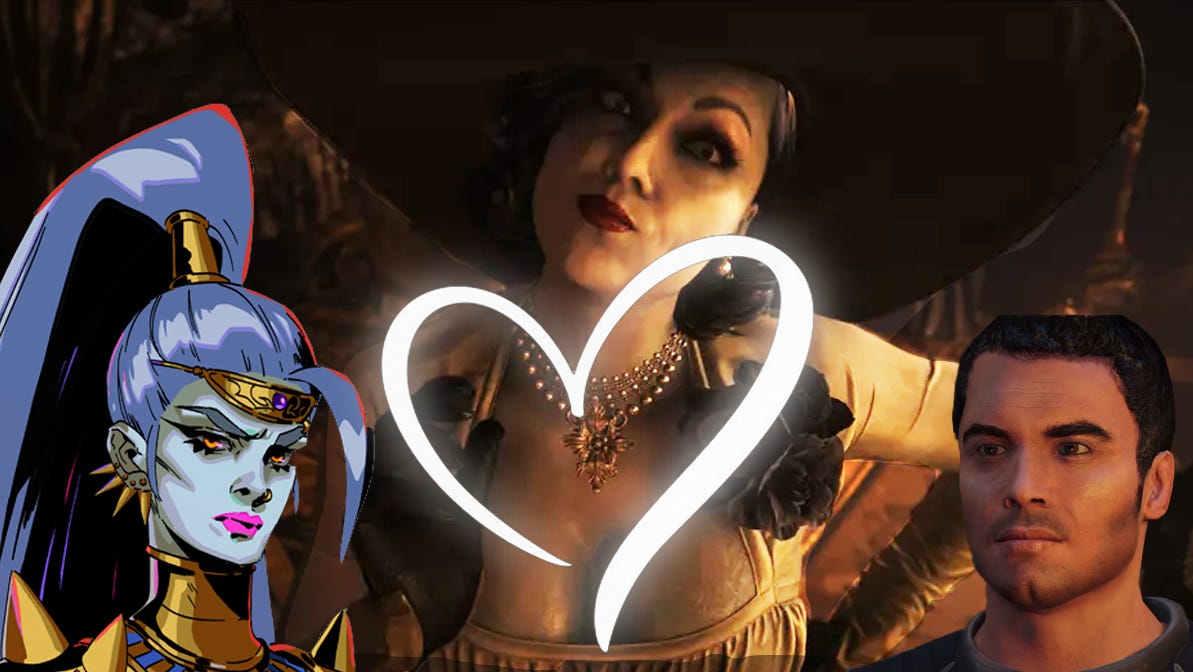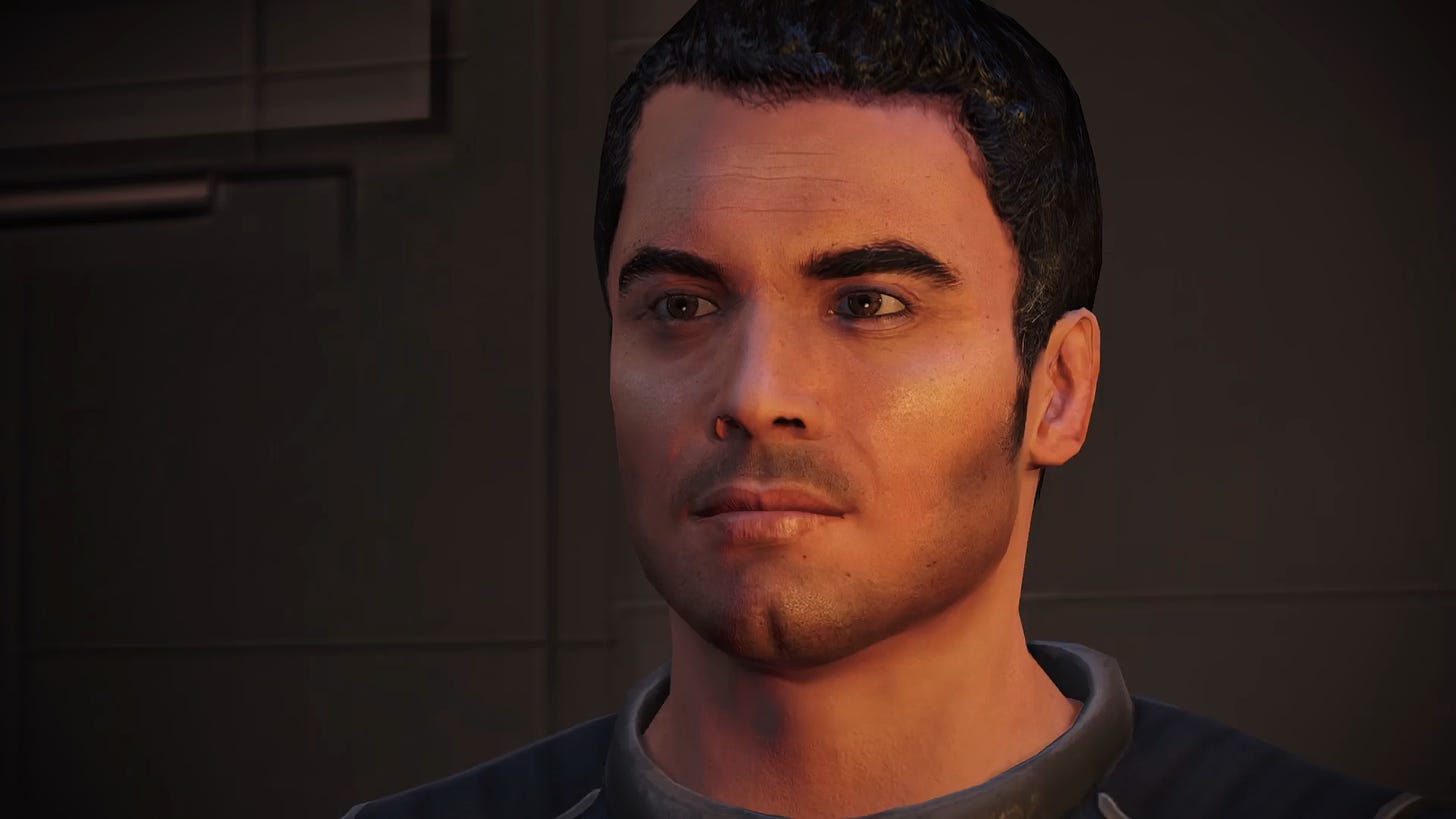Bad romance: where video game love stories go wrong
The interactive nature of games can lead to some of the most memorable romances in fiction. More often it leads to tragedy.
Every game can be a dating sim if you’re brave enough.
I’m not talking about dating sims where the character you play is brave, such as the date-your-weapons dungeon crawler Boyfriend Dungeon. I don’t mean the “dating” sims available in the adult only section on Steam that you would personally be very bold to play in public, either.
No, I mean all games can be approached as a dating sim if you, the player, desire it and have the will to make it so. If there’s a character in a game and you can interact with them in any way at all, that’s a potential dating sim.
Take Resident Evil Village, for example. This was the game that introduced the world to Alcina Dimitrescu – a 9’6” tall middle-aged vampire lady who became the object of half the planet’s affection the moment she debuted. In-universe the character you play as is terrified of her, as you probably would be if you were suddenly confronted with a giantess with retractable claws, a murderous grudge, and a vast dungeon complex.
But out-of-universe Lady D acquired a veritable army of simping fans, of which I am only-just-ashamedly one. Frankly the only reason she didn’t awaken something in me is because it was already awake, prowling around the house at night in a dressing gown with one hand deep in a packet of Cheerios.
She’s a slightly less intimidating Hannah Waddingham, and everyone loved her for it.
While the character I was controlling was terrified of Lady D, I had a great time playing cat-and-mouse with her throughout Castle Dimitrescu, getting chased coquettishly while she took swipes. There was an innocent, almost sweet aspect to her pursuing my character through the blood-soaked halls and torture chambers. You call it attempted murder; I call it a courtship.
But it’s not just Lady D who transcends her genre and makes the player approach a non-romance based title as a dating game. The 4 vs. 1 horror title Dead By Daylight, for example, launched the spin-off title Hooked on You. It’s a dating sim in which players can romance four stone cold killers from the main game - The Huntress, The Spirit, The Trapper, and The Wraith. It’s tongue-in-cheek, yes, but the feelings that led to it had to come from somewhere.
And the criminally underrated sci-fi arena sport title Omega Strikers launched a time-limited dating sim mode, such was the hunger from fans to romance their favourite midfielders.
But really, what we’re talking about here isn’t actually dating sims. What we’re talking about is well-written, beautifully executed characters that fans and perverts alike glom onto. It’s the mark of good art that you could fall in love with any character, provided they’re well-rounded and vividly drawn. As you’ll have noted from the previous 410 words, people are more than capable of introducing a romantic narrative into situations that absolutely do not call for it.
Which brings us neatly onto the meat of this article – the impact of a bad romance in games that make the dating aspects a core part of their narratives.
Mean to Kaidan
Mass Effect is nominally a sci-fi adventure game about stopping a race of alien machines wiping out life in the Milky Way. In reality, because of its focus on building a crew and customising your character, it is at least partly a dating sim. You can, if you wish to take a break from halting the Reapers exterminating all life in the Milky Way, pursue an office romance with your crewmates.
This is Kaidan, who appears in the first Mass Effect. If he has a last name, I’ve forgotten it.
He’s an amorphous beige puddle of nothing, forced onto your team of space adventurers like a filling shoved into a tooth. To quote Bob’s Burgers, if he was a spice he’d be flour. His hobbies involve sitting in a plain room and staring at the wall until it’s time to ruin your day. He has twice the charisma of Kit Harrington, which is to say he has zero charisma. You’ve already forgotten what he looks like, because he doesn’t look like anything.
You can’t call him ‘bland’ because the hard ‘d’ sound at the end is too exciting for him – but unfortunately it’s a hard D he’s trying to give you.
The second time I played through Mass Effect my custom character – Sophie Shepard – was a woman. Unfortunately, playing as what the community calls ‘Femshep’ means that Kaidan is a viable romantic option for you – in much the same way that choosing to eat uranium is a viable meal.
At some point it became clear that the game was trying to pair Kaidan up with Sophie – or at least earnestly to present the option. Whether through relatively subtle dialogue options or by having him constantly present like a lingering odour, the mere fact of his presence aboard the Normandy means the game is constantly weighing him up as a romantic partner for your character. And – given that even well-made games like Mass Effect only offer you limited dialogue choices – you can blindly stumble into leading him on.
Bad choice railroading
To illustrate the scale of that dialogue issue, examine this clip from the Best Friends Play playthrough of The Wolf Among Us. In it, the players misinterpret the option ‘glass him’ to mean ‘buy this person a drink’ in an attempt to reconcile with them. As you might expect, this has the exact opposite outcome from the one they desired.
Now imagine if, instead of telling someone you aren’t interested in them romantically, you accidentally press a button that warps the two of you to the altar with a speed normally reserved for Vegas weddings.
If you’re even vaguely friendly towards Kaidan, the little needle that measures characters’ affection for one another ticks inexorably towards ‘romance’. If you’re anything like me, that means you end up interacting with him as little as possible until it is time to have him explode on Virmire. Spoilers. If I could have, I’d have increased the payload.
What little time I did spend interacting with him was spent being mean to him to prevent that needle ticking up. I was actively locking myself out of gameplay options to prevent the possibility of romance — because if I made the wrong choice one too many times, the actually interesting romance developing between Sophie Shepard and Liara T’Soni would be derailed.
Kaidan isn’t the sole cause of confusing prompts that lead to unexpected romance like this within the Mass Effect series (I’m looking at you, Jack). He certainly isn’t the only example of it in gaming in general. There were a glut of games in the late-2000s to early-2010s that were so bad about it, in fact, that Saint’s Row IV of all games parodied it.
And the limitations of video game dating didn’t end there. In this playthrough of 10 Dates you can see my girlfriend repeatedly baffled by poorly-presented choices in an FMV dating game from earlier this year.
Admittedly since Mass Effect then there have been games that are far, far better about weaving choice-based romances into their games. You have to actively work to romance either Megaera or Thanatos in Hades, for example, while the recently-released Thirsty Suitors is a game based almost entirely around reconciling with exes in a way that feels coherent and obvious despite being heightened. Even Speed Dating for Ghosts manages to present choice-based romances that feel natural despite the supernatural.
But, as mentioned earlier, people would fall in love with a mesh mannequin if it was written and presented with personality. Where video game romances go wrong is when gameplay systems push flat, boring characters just because they can.
Now, if you’ll excuse me, I’m heading back to Castle Dimitrescu.





